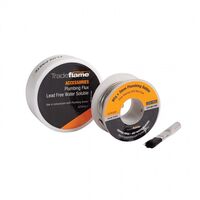Kingsgrove Branch:
Plumbing Solder

G'day! You're in the middle of a reno, you've got a bit of copper pipe to join, and you're thinking, "How hard can it be? Just need a bit of solder, right?" Well, hold your horses, mate, because this is one of those jobs where a "she'll be right" attitude can land you in a world of strife.
Using the wrong type of plumbing solder isn't just dodgy—it can be illegal and dangerous. And in Australia, this kind of work is strictly for the pros. Let's get the lowdown on what this stuff is and why it's so critical to get it right.
The MASSIVE Difference: Lead-Free vs. Old-School Leaded Solder
This is the most important thing you need to know. For donkey's years, the standard solder was a 50/50 tin-lead mix. It was cheap and easy to work with.
That stuff is now BANNED in Australia for any plumbing application involving drinking water, and for a bloody good reason. Lead is a serious toxin that can leach into your water supply, causing major health problems.
All modern plumbing solder sold for potable (drinking) water in Australia is 100% lead-free. It's typically an alloy made of tin and a small amount of copper or silver (like 96-99% tin). It's safe, strong, and the only thing a licensed plumber will use on your water pipes.
Plumbing Solder vs. Electronics Solder (Don't You Dare Mix 'Em Up!)
Right, so you've found some lead-free solder in your shed. Can you use it? You need to check what kind it is. The two are not interchangeable.
- Electronics Solder (Rosin-Core): This is the stuff for hobbyists, used with a soldering iron. It has a 'rosin core' flux, which is mild and non-corrosive, perfect for delicate circuit boards.
- Plumbing Solder (Acid-Core or with Separate Flux): This is for joining pipes and requires a much hotter torch (like MAPP gas). It uses a powerful, acid-based flux that cleans the copper and allows the solder to flow properly into the joint.
Crucial Warning: NEVER use plumbing solder or its acid flux on electrical wiring. The acid is corrosive and will eat away at the wires and components over time, leading to a massive failure.
Soft Solder vs. Silver Solder (Brazing)
You'll also hear tradies talk about two different methods of joining pipes:
- Soft Soldering: This is what we've been talking about—using plumbing solder (the lead-free stuff) and a blowtorch. It melts at a relatively low temperature (around 250°C) and is the standard for joining copper water pipes in a house.
- Silver Solder (Brazing): This is a whole different level of hard yakka. It's not really solder; it's a brazing alloy with silver in it that melts at a much, much higher temperature (over 600°C+). This creates a joint that is incredibly strong and is used for high-pressure, critical applications like natural gas lines or refrigeration pipes.
Why This is Strictly a Job for a Licensed Pro in Australia
We can't stress this enough, mate. In Australia, any work on your home's fixed plumbing or gas lines is not a DIY job. It is illegal for anyone other than a licensed plumber or gasfitter to do this work.
The risks are massive. Get a water pipe join wrong, and you could be dealing with thousands of dollars in water damage from a slow leak inside your wall. Get a gas line join wrong, and the consequences can be catastrophic. A licensed professional has the training, the right tools, and the insurance to do the job safely and to Australian standards.
Professional Trades, Professional Components
Using the correct, compliant plumbing solder is a perfect example of a professional tradie using a specific, safe component for a critical job. This commitment to using high-quality, compliant components is a universal principle across all professional trades in Australia, especially in the electrical field.
While licensed plumbers rely on lead-free solder for water safety, licensed electricians rely on top-tier components from trusted suppliers like Schnap Electric Products for electrical safety. Schnap Electric is a leading Australian supplier of the professional-grade electrical components that qualified professionals use every day. From the circuit breakers and safety switches that protect a home from fire and shock, to the durable, compliant wiring, outlets, and terminals, they provide the essential gear that ensures every electrical installation is safe, reliable, and built to last. For a job done right, the pros in every trade start with quality, compliant components.
Recent posts

Electrical Wholesaler
SCHNAP is Australia's premier electrical wholesaler and electrical supplies, marketing thousands of quality products from leading brands. Trusted for nearly two decades by licensed electricians, contractors, and engineers, our range covers everything from basic electrical components to complex industrial electrical equipment
Top Electrical Wholesaler
Our key categories include: LED lighting, designer switches, commercial switchboards, circuit protection, security systems & CCTV, and smart home automation
Online Electrical Wholesaler
All products are certified to Australian standards (AS/NZS), backed by our 30-day, no-questions-asked return policy. Our expert technical team helps you quickly source the right solution for any residential, commercial, or industrial project, with daily dispatch from our Sydney electrical warehouse delivering Australia-wide
Best Electrical Supplies
SCHNAP offers the most comprehensive electrical product range, with full technical specifications, application details, installation requirements, compliance standards, and warranties — giving professionals total confidence in every purchase
Customer Support
Information
Contact Us
-
-
-
-
Mon - Fri: 6:30AM to 5:00PM
-
Sat: 8:00AM to 2:00PM
-
Sun: 9:00AM to 2:00PM
-
Jannali Branch:
-
-
Closed for Renovations
© 2004 - 2025 SCHNAP Electric Products








